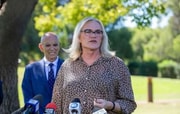Want to make extra cash before the election? These jobs are hiring right now!
By
Maan
- Replies 8
Australia’s electoral process relies on a seamless operation behind the scenes, ensuring every voter has their say when the country heads to the polls.
As the countdown begins for the upcoming federal election, a significant challenge has emerged—one that could impact how smoothly the voting process unfolds.
Here's what you need to know about the urgent demand for thousands of workers and the crucial role they will play.
The Australian Electoral Commission (AEC) needed over 100,000 workers to fill vital roles for the upcoming federal election, with Prime Minister Anthony Albanese officially marking the countdown to the 3 May vote.
While politicians prepared to crisscross the country with campaign promises, the AEC focused on ensuring the election process ran smoothly, highlighting the urgent demand for temporary staff.
A spokesperson for the AEC said: ‘We’re particularly interested in those living in rural and regional areas to put their hand up and work for us to help deliver the next federal election.’
The AEC acknowledged that staffing shortages were often a challenge in regional areas and encouraged locals to step forward.
‘It can sometimes be difficult for us to find staff in regional areas so we’re really hopeful people will get involved in their communities to make sure people in their area can vote,’ the spokesperson said.
Those fluent in languages other than English were also in demand, as they could assist voters who needed in-language support on election day.’
‘Those proficient in more than one language are a great asset, offering in-language support to other community members in the polling place on voting day,’ the spokesperson said.
The commission also sought workers for mobile polling teams, which travelled to voters unable to attend standard polling places.
These teams visited remote communities, aged care homes, mental health facilities and prisons to ensure everyone had access to the ballot.
No prior experience was required, with training provided for all successful applicants.
A range of temporary roles were available across a seven-week period, covering pre-election, election day and post-election duties.
Pay rates varied depending on the role, with workers earning between $25 and nearly $50 per hour, including a 25 per cent loading.
Overtime attracted additional loadings of 50 to 100 per cent, increasing potential earnings for those working extended hours.
Applicants needed strong attention to detail, the ability to follow processes, teamwork skills, and the physical capability to sit or stand for long periods and lift up to 12 kilograms.
The AEC reminded Australians to ensure their enrolment details were correct before the deadline at 8:00 pm local time on 7 April.
‘Make sure your enrolment details are up to date before this deadline,’ the spokesperson said.
In a previous story, we covered the essential steps Australians need to take to ensure they are ready to vote in the upcoming federal election.
With the deadline approaching, it’s more important than ever to check your enrolment details.
Read more to make sure you don’t miss your chance to have your say.

With thousands of election jobs up for grabs, would you consider signing up for one? Let us know your thoughts in the comments.
As the countdown begins for the upcoming federal election, a significant challenge has emerged—one that could impact how smoothly the voting process unfolds.
Here's what you need to know about the urgent demand for thousands of workers and the crucial role they will play.
The Australian Electoral Commission (AEC) needed over 100,000 workers to fill vital roles for the upcoming federal election, with Prime Minister Anthony Albanese officially marking the countdown to the 3 May vote.
While politicians prepared to crisscross the country with campaign promises, the AEC focused on ensuring the election process ran smoothly, highlighting the urgent demand for temporary staff.
A spokesperson for the AEC said: ‘We’re particularly interested in those living in rural and regional areas to put their hand up and work for us to help deliver the next federal election.’
The AEC acknowledged that staffing shortages were often a challenge in regional areas and encouraged locals to step forward.
‘It can sometimes be difficult for us to find staff in regional areas so we’re really hopeful people will get involved in their communities to make sure people in their area can vote,’ the spokesperson said.
Those fluent in languages other than English were also in demand, as they could assist voters who needed in-language support on election day.’
‘Those proficient in more than one language are a great asset, offering in-language support to other community members in the polling place on voting day,’ the spokesperson said.
The commission also sought workers for mobile polling teams, which travelled to voters unable to attend standard polling places.
These teams visited remote communities, aged care homes, mental health facilities and prisons to ensure everyone had access to the ballot.
No prior experience was required, with training provided for all successful applicants.
A range of temporary roles were available across a seven-week period, covering pre-election, election day and post-election duties.
Before the election jobs:
- Pre-poll Officer in Charge
- Pre-poll Second in Charge
- Pre-poll Officer
- Early Voting Liaison Officer
- Contingent Early Voting Officer (Mobile Polling and Pre-Poll)
- Contingent Early Voting Leaders
On election day:
- Polling Place Liaison Officer
- Polling Place Officer in Charge
- Polling Place Second in Charge
- Declaration Vote Issuing and Inquiry Officer
- Polling Assistant
- Polling Assistant (Bilingual)
- Polling Assistant (First Nations)
- Scrutiny Assistant
- Scrutiny Assistant (Return of Materials)
After the election:
Pay rates varied depending on the role, with workers earning between $25 and nearly $50 per hour, including a 25 per cent loading.
Overtime attracted additional loadings of 50 to 100 per cent, increasing potential earnings for those working extended hours.
Applicants needed strong attention to detail, the ability to follow processes, teamwork skills, and the physical capability to sit or stand for long periods and lift up to 12 kilograms.
The AEC reminded Australians to ensure their enrolment details were correct before the deadline at 8:00 pm local time on 7 April.
‘Make sure your enrolment details are up to date before this deadline,’ the spokesperson said.
In a previous story, we covered the essential steps Australians need to take to ensure they are ready to vote in the upcoming federal election.
With the deadline approaching, it’s more important than ever to check your enrolment details.
Read more to make sure you don’t miss your chance to have your say.
Key Takeaways
- The AEC needed over 100,000 workers for the 3 May federal election, with roles available before, during and after voting day.
- Regional areas faced staffing shortages, and bilingual applicants were in demand to assist voters needing language support.
- Pay ranged from $25 to nearly $50 per hour, with overtime attracting up to 100 per cent loading.
- Australians had until 8:00 pm local time on 7 April to update their enrolment details.
With thousands of election jobs up for grabs, would you consider signing up for one? Let us know your thoughts in the comments.








